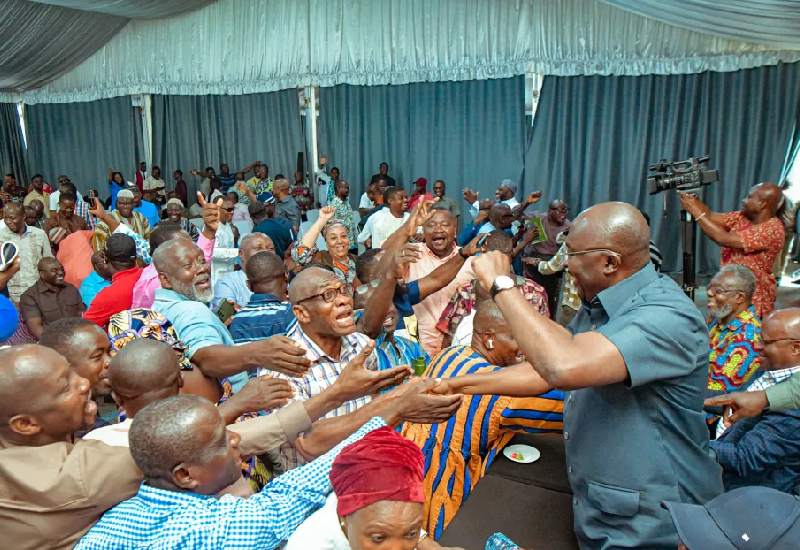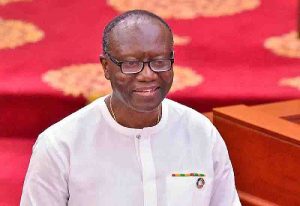By Godwin Owusu Frimpong
While the article reports on an endorsement for Dr. Mahamudu Bawumia from a coalition of former MMDCEs, a critical analysis, considering the NPP’s recent electoral performance, reveals several layers of significance and potential underlying dynamics.
Contextualizing the Endorsement:
The backdrop to this endorsement is crucial: the New Patriotic Party (NPP) has just experienced a significant defeat in the 2024 general elections, losing power after eight years. This loss, characterized by widespread public dissatisfaction with economic conditions and governance, creates a challenging environment for any aspiring leader seeking to revive the party’s fortunes. In this context, the public declaration of support from a substantial group of former MMDCEs is not merely a statement of preference; it is an attempt to project an image of party unity and a forward-looking strategy in the face of adversity.
The Strategic Significance of MMDCEs:
Former MMDCEs represent a vital demographic within the NPP. Their tenures, spanning from 2017 to 2024, mean they were deeply involved in the party’s grassroots mobilization and implementation of government policies at the local level. Their claim of having “95% of us having previously served as Constituency and Regional Executives, some for over 16 years” underscores their intimate knowledge of the party’s machinery and electoral architecture. This deep-seated experience implies they possess established networks and a capacity to influence voter behaviour and party delegates.
Their pledge to “mobilise at the grassroots in all 16 regions,” “engage in door-to-door campaigns,” and “counter misinformation with facts” suggests a commitment to an active, ground-level campaign. This is particularly important for Bawumia, who, as the outgoing Vice President, will need to navigate the complexities of a post-election leadership contest and present himself as the most viable option to lead the party back to power. The emphasis on “resourcing the campaign through fundraising and logistical support” further highlights the practical, rather than purely symbolic, nature of their endorsement, indicating a potential pooling of financial and organizational capital.
Examining the “Why” Behind the Endorsement:
While the coalition presents its endorsement as a result of “extensive consultations” and a “thorough assessment of competence and vision,” it is essential to consider other potential motivations.
- Self-Preservation and Future Political Capital: For these former MMDCEs, aligning with a frontrunner like Bawumia could be a strategic move to secure their own future political relevance within the NPP. By being seen as early supporters of a potentially successful candidate, they position themselves to be considered for appointments or roles should Bawumia emerge victorious in the party’s flagbearership race and subsequently win the general election. Their past service, while valuable, does not guarantee continued influence without strategic alignment.
- Rebuilding the Party’s Image: The NPP faces the daunting task of regaining public trust after the electoral defeat. This coalition might see Bawumia as the most capable individual to lead this rebuilding effort, perhaps distancing the party from the perceived failures of the previous administration while leveraging his own track record. Their endorsement can be interpreted as an attempt to project continuity and a renewed sense of purpose.
- Influencing the Party’s Internal Dynamics: In the aftermath of an election loss, the NPP is likely to experience internal debates and power struggles. This coordinated endorsement from a significant bloc of former officials serves to influence these internal conversations, signaling to other party factions that Bawumia has substantial backing from experienced party operatives. It’s a pre-emptive move to shape the narrative and build momentum.
Potential Challenges and Criticisms:
Despite the strong words of support, the endorsement is not without its potential challenges and criticisms:
- The Shadow of the Electoral Loss: The fact that these former MMDCEs served under an administration that lost power inevitably casts a shadow over their pronouncements. Critics might question their judgment or their ability to deliver electoral success, given their direct association with the previous government’s performance. Their efforts to “counter misinformation” might be seen as an attempt to deflect blame rather than address the systemic issues that led to the defeat.
- Perception of Party Elite vs. Grassroots Sentiment: While the former MMDCEs represent a significant segment of the party’s established structure, their endorsement may not automatically translate into widespread grassroots acceptance. The electorate’s decision in 2024 indicated a desire for change, and the party must demonstrate a genuine understanding of, and response to, these sentiments. If the endorsement is perceived as an attempt by the party elite to dictate the direction, it could backfire.
- The Nature of “Consultations”: The claim of “extensive consultations with all aspirants” before endorsing Bawumia warrants scrutiny. It would be important to understand the depth and inclusivity of these consultations. If other aspirants felt sidelined or their views inadequately considered, it could create internal divisions rather than foster unity.
Conclusion:
The endorsement of Dr. Mahamudu Bawumia by the Forum of Former MMDCEs is a significant development in the NPP’s post-election landscape. It signals an attempt by a seasoned group within the party to rally behind a particular candidate, leveraging their experience and networks to secure a future victory. However, in the shadow of the recent electoral defeat, this endorsement must be viewed not just as a vote of confidence but also as a strategic manoeuvre within the complex internal politics of the NPP. The true measure of its success will lie in its ability to resonate with the broader party base and, more crucially, to help the NPP reconnect with the Ghanaian electorate and address the prevailing concerns that led to their recent loss. The effectiveness of this coalition will be tested by their capacity to mobilize genuine support and articulate a compelling vision for the party’s future that goes beyond simply reiterating past achievements or deflecting blame.
Godwin Owusu Frimpong




